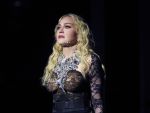Trans Icon Carmen Carrera On How Gay Nightclubs Helped Her Find Her True Self

When Omar Mateen opened fire at Pulse – a gay nightclub in Orlando in the middle of Pride Month and on a Latin-themed night – he robbed the queer Latinx community of a safe space. This is a topic Latino USA tackles in its latest episode, “Sanctuaries.” As LGBTQ people of color face discriminatory policing, harassment, and a disproportionate amount of violence, the club has become a place of solace and one that encourages everyone to be their full selves. This is exactly what happened to former RuPaul’s Drag Race contestant Carmen Carrera.
At 18, she resigned herself to living an unfulfilling life. “When I was 18, I went out,” the New Jersey native told LUSA. “I was like, all right, well I wish I could be a girl, but that’s not going to happen. God’s not going to magically make me a girl tomorrow, so I guess – at the time – I’m going to have to function as a gay male… [So I went out to gay clubs and] that’s when I learned about transgender and that’s when I learned about drag performers. And I learned all about these things, and I got to know that community separate from my world.”
Having built a base of friends in Florida, Carrera found herself in Orlando frequenting Parliament House and Pulse – places where she felt at home. The first time she went to Pulse, she couldn’t have been more than 22, and many of the same people she befriended that first night happened to be at Pulse when tragedy struck. As Carrera explains it, that’s how “insanely loyal the gay community is to their establishments.”

For “Sanctuaries,” Maria Hinojosa and co. spent about an hour breaking down how LGBTQ communities of color constantly face challenges. “What we witness in the face of such destructive acts, like the one in Orlando, is the absolute and incredible resilience of queer communities of color,” she said. “Those within the community have always known, but now the entire world knows that those risks are very very real.”
The rest of the episode looks into the death of Julio Rivera and how his family and friends mobilized to get New York to recognize it as the first anti-gay hate crime in the state, as well as what it was like to come out for a gay father and son, and Chaska Sofia, aka DJ Precolumbian, on the connection between dancing and trauma. Check out the full episode below: